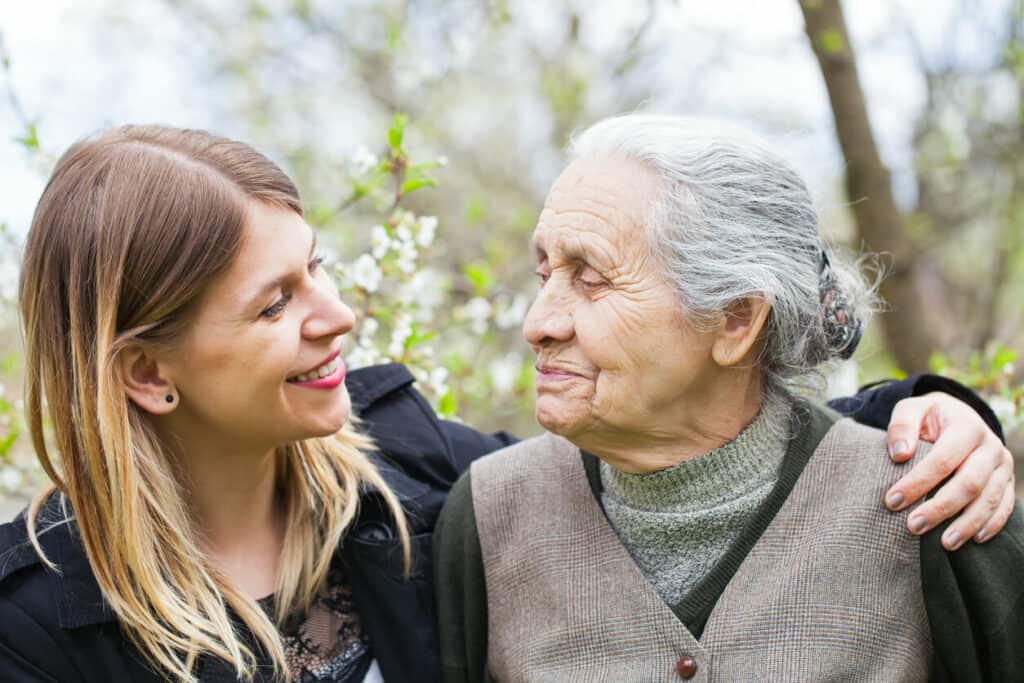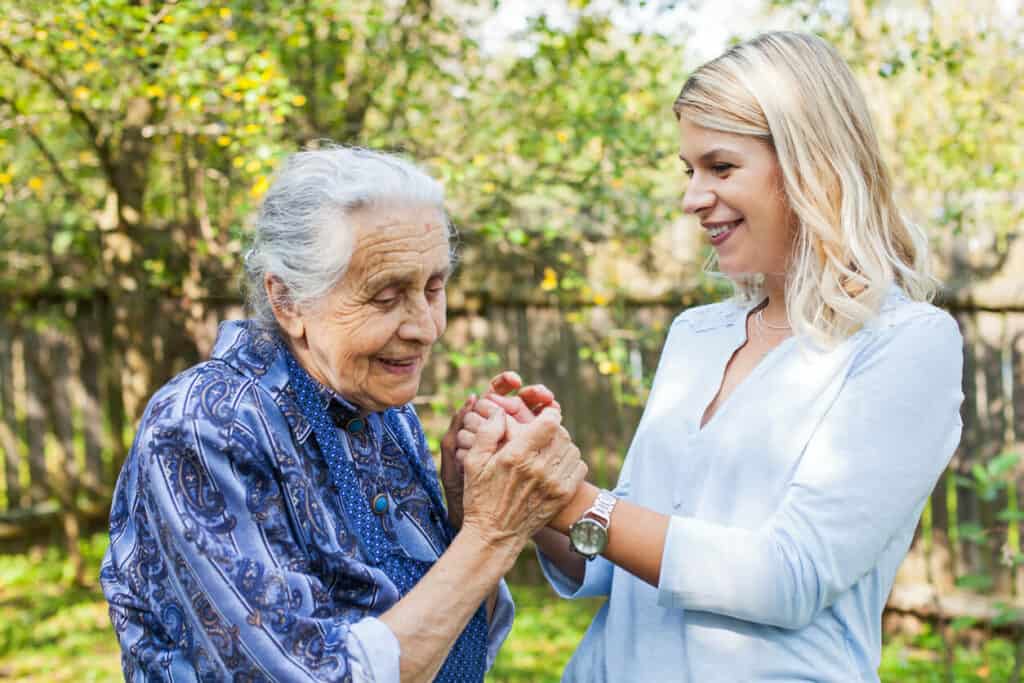If your loved one experiences a severe accident, memory loss, or requires assistance following a surgery, their life changes forever. Yours also changes when you and your siblings take on the role of immediate, round-the-clock family caregivers.
About 34.2 million Americans provide unpaid care to their elderly loved ones. The overwhelming caring responsibilities can make family caregivers live under constant stress, loneliness, and exhaustion.
Due to this, family caregivers must have a support system. Amy’s Eden caregivers can be that support to assist you so you can comfortably care for your loved one. With extra help, you don’t compromise other aspects of your life.

Benefits of Providing Care for Family Members
Family caregivers are individuals who undertake the vital role of providing care and support to a loved one who is dealing with a disability or health care challenges. Their responsibilities include managing medications, coordinating doctor appointments, and assisting with activities of daily living like bathing and dressing.
By caring for your elderly parents, you can help reduce healthcare expenses while ensuring they receive the assistance they require at any critical point.
As a family caregiver, especially if you don’t have a medical background, you will encounter various challenges, like not fully understanding your loved one’s health situation. But it gets simpler after you learn things and figure out your way around caregiving.
Caregiving can mentally and physically drain you, so we’ve rounded up 10 tips to make your caregiving experience as healthy as possible.
These suggestions can guide you to take exceptional care of your loved ones without leading to caregiver burnout.
1. Prepare Before Becoming a Family Caregiver

Your journey as a caregiver will be unique from everyone else’s. It will be particular to your own experience. But one common factor among family caregivers is the lack of preparation for the role, as most adult children become caregivers unexpectedly.
Hence, whether you decide to become a family caregiver out of love for your elderly loved one, because no one else can do it, or just because it’s the right and honorable thing to do, you must be willing to put a lot of effort into learning the ropes of caregiving.
You may even need to take caregiving training to help you prepare for the challenges ahead of you. Remember that there is no shortcut to caregiving.
2. Give up Every Preconceived Social Idea and Expectation About Family Caregivers

As you prepare to become a caregiver, you must let go of all the societal expectations and preconceived notions about what it means to be a family caregiver. For instance, if you take care of a senior loved one with dementia or Alzheimer’s, you may be stigmatized by people who believe that one day, you will also get diagnosed with the same disorder. Presumptions like this are harmful to your mental health.
Beginning with a blank slate and letting go of people’s expectations of you will make it easier for you to accept your path as a caregiver. Instead of focusing on negativity, the best thing you can do to ensure your loved one receives adequate care is to learn and provide what they require.
3. Be Organized
Being organized is one method to make sure you keep some sense of balance between providing care and your personal life. These pieces of advice are helpful when taking care of a family member.
- Create a contact list of all the people and organizations needed for the care provision and decision-making involving your loved one’s care. This includes their doctor, lawyer, financial adviser, insurance company, and immediate family members.
- Keep a family calendar with everyone’s schedule of major events on it. You can arrange your appointments through this calendar to avoid conflicts of schedules between your personal event and your loved one’s doctor’s visit.
- Keep track of the prescriptions your loved one is taking, including the dosage and the times they take them. Put them into a note and place them in visible areas of the home.
- Know the contact information for your loved one’s in-home care providers, like their caregiver or therapist, and take note of their arrival and departure times.
- List the home tasks that you need help with. If other family members and friends visit, ask if they can help you complete some of the tasks on the list. For instance, if you have a sister who is an excellent cook, ask if she can prepare ready-to-eat meals that you can reheat when you don’t have time to cook for your loved one.
- Look around the home to determine if any modifications are required to make it more accessible for your loved one. If they have incontinence and mobility issues, installing a wheelchair ramp and grab bars in the toilet can promote better mobility.
4. Prioritize Communication
Create a Facebook or Whatsapp group, or use other relevant tools to maintain contact with your loved one and other family members. When everyone uses the same communication platform, everybody can stay informed of your loved one’s health situation, and it’s also easier for you to reach out to family and friends for assistance.
5. Understand That Caregiving is A Challenging Job

One of the most demanding jobs you can do is care for your family. You will be a jack of all crafts. One moment, you’ll nurse your loved one, then wind up analyzing legal paperwork with the help of a lawyer next.
You must acknowledge your limitations as a caregiver to maintain a healthy balance of caregiving and other aspects of your life. Otherwise, you run the risk of emotional fatigue.
Learn more about the health condition of your elderly parent by reading online resources and perhaps taking caregiving training specific to that condition, for instance, dementia. Doing this can help you prepare for future challenges.
Employed caregivers work nearly 35 hours a week. Unpaid family caregivers like you may need to provide care close to this number of weekly hours. You must find ways to balance your work, family life, and caregiving obligations.
6. Find Time to Take Care of Your Mental Well-Being
Most family caregiving responsibilities are unpaid, and the impact of not having the financial resources to support their needs can contribute to mental exhaustion.
Mental health conditions are prevalent among caregivers. For those who juggle a full-time career with caregiving, unmanaged stress can lead to mental health disorders and impact an individual’s work performance and decrease their productivity.
Regardless of how busy you are with your work, you must find time to evaluate and provide for your own needs for your mental health. Amy’s Eden has trained caregivers ready to provide respite care, so you can take a moment to focus on yourself.
To find services and support, you can search for information and resources online through websites like the United States Department of Health and Human Services caregiver support program site. It offers a range of programs and services, such as counseling, support groups, and educational programs that address the needs of caregivers. Some of these programs are free, and many are provided by local and state government agencies.
7. Go With The Flow

Caregiving doesn’t let you adhere to a schedule or time frame. You can’t predict how long you will take care of your loved one. You should keep in mind that it may last for a few weeks to several years.
In this case, you should prepare for the future, but don’t over-stress your situation, as it can affect your health and the quality of care you provide. Let go of any future expectations and concerns and prioritize what you can do now.
8. Don’t Aim to be Perfect

Caregiving is challenging even enough without demanding perfection from yourself, the person you care for, or both.
As a caregiver, you will want your loved one to follow all their doctor’s recommendations, such as when they should take their medications and what activities they should do after mealtimes. If they miss something, don’t criticize or get mad at them. If you caught your senior dad smoking, even if their doctor suggested that they quit, don’t yell at them.
Gently remind them what they should and shouldn’t do to improve their health. Give up the idea that caregiving should be perfect or that the person you care for should follow the treatment plan perfectly. Thinking and seeking perfectionism from yourself or your loved one will ultimately burn you out.

As a caregiver for a family, you will require more than availability to succeed. You should consider your:
- Skills,
- Location,
- Family dynamics,
- Finances,
- Temperent,
- Emotional well-being,
- Physical strength
Some of these factors can affect how you care for your loved one. You should not feel guilty if you think you lack the capabilities to care for your loved one.
Be honest with yourself and recognize the extent of what you do for a loved one. If you need to rest, don’t hesitate to ask another family member for support.
You can also look into the available care options near you and contact agencies offering respite care.
10. Identify if You Need Help

You shouldn’t feel embarrassed or frustrated about needing help. It’s normal to feel overwhelmed when faced with a considerable caregiving responsibility. Even long-time caregivers who get a handle on things can also need help.
One way to make caregiving easier is to admit that you need help. This help may entail relocating your loved one to an assisted living where they can receive adequate care or simple help from another family member to pay their bills and check their insurance policy.
Support programs are available for different groups of caregivers, including veterans, families with a child with a disability, and those caring for an aging loved one.
Takeaway
We at Amy’s Eden know how demanding caregiving can be. We’re here to help you handle and overcome the challenges of caring for an older loved one. We’re a phone call away if you want a backup to assist you in taking care of your senior mom or dad and doing housekeeping tasks and other activities of daily living.
You don’t have to go through the caregiving journey alone. We are here to hold your hand and take care of your elderly loved one the same way you take care of them.
Try to follow the tips outlined above to make caregiving less stressful and debilitating to your health. More importantly, be kind to yourself and give yourself time to develop as a caregiver. Don’t be too hard on yourself if you can’t provide for your loved one’s care demands.




